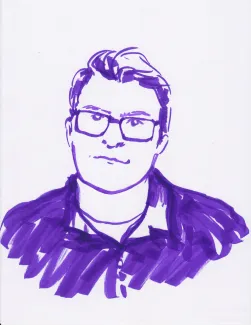“It’s impossible to predict exactly what questions you will be asked [in a job interview]. So, how do you get ready?” Derek Attig poses in their recent Inside Higher Ed article.
Attig is the assistant dean for career and professional development in the Graduate College and has years of experience helping graduate students explore career paths and prepare for job searches. We spoke with them about their experience and role in graduate education.

Question 1: Tell us a bit about yourself
As assistant dean, I run a career office that works with all grad students and postdoctoral scholars at the university. I’ve been in the Graduate College for ten years, and I also recently served as President of the Graduate Career Consortium, a professional association of people who do the kind of work I do. Before I started at the Graduate College, I earned a PhD in History here at the university and worked in nonprofit marketing and communications.
Question 2: What services does the Graduate College Career Development Office offer?
In the Graduate College Career Development office, our focus is on helping grad students and postdocs figure out what matters to them, identify fulfilling career paths, and pursuing opportunities during and beyond their time at the university. We work with all doctoral and master’s students.
Practically, we support students in career exploration, faculty job search, industry and nonprofit job search, and aligning graduate school and professional development. We do that through individual career advising, workshops (for all of campus and by request for departments and student organizations), and through collaborations with graduate programs.
Question 3: What inspires you to work with graduate students?
Over the years, in career advising, I have sat across from thousands of graduate students enrolled in hundreds of different doctoral and master’s programs. Those students came from all over the world, and from across town. Those students entered grad school straight from undergrad, or after years of work experience.
Each of them followed a different path to graduate education, and had different reasons for seeking career support. Some were struggling to talk about their specialist research in ways that made sense to nonacademic employers, and others were trying to figure out what on earth a Teaching Statement is supposed to look like.
But for all their different paths and different needs, they are all here at the university to learn and develop and change the world. I love how curious, driven, stubborn, and hyperfocused grad students are. I love hearing grad student after grad student after grad student talk about how they want to use their work to make a positive impact on their communities and the world. I love helping grad students reflect on their abundant (if sometimes scattered) experiences and identify promising paths toward a fulfilling future.